The Chancellor has been urged to abandon plans to raise and extend the windfall tax on oil and gas companies after a survey found confidence in the sector has hit a record low.
Research by the Aberdeen and Grampian Chamber of Commerce (AGCC) showed confidence in the future of the North Sea over the next one to five years has reached its lowest point since the survey started in 2004.
The survey, of 111 energy and supply chain businesses, recorded a positivity rating of -85%.
That’s much lower than the previous lowest mark set during the oil price crash of the mid-2010s when confidence dipped to about -50%.
The AGCC said Chancellor Rachel Reeves risks the jobs of 100,000 workers in the industry if the Energy Profits Levy (EPL) is extended in this year’s Budget.
AGCC chief executive Russell Borthwick said her tax plans were having “a chilling effect on the sector”.
He said: “Unless steps are taken in the Budget to address this, then the damaging consequences in terms of future investment activity, employment and the economic future of the North-east Scotland region could be severe.
“You do not fix a grave economic situation by putting tens of thousands of people out of work, which is looking increasingly like the outcome we face after October 30.
 PA Media
PA Media“The Energy Profits Levy appears to be the only windfall tax on any sector, anywhere in the world.
“On the basis that windfall conditions no longer exist and market prices for oil and gas have returned to ordinary levels, Treasury should maintain allowances within the current oil and gas fiscal regime and work towards the swift removal of the EPL entirely.”
The industry body Offshore Energies UK (OEUK) has forecast that 35,000 direct jobs could be lost if the UK Government moves ahead with its tax plans, while investment bank Stifel estimates up to 100,000 could be indirectly impacted.
OEUK also warned the plans would cost the economy about £13 billion over the next five years and lead to a fall in tax receipts.
 PA Media
PA MediaUnder the Government’s proposed changes, the EPL would rise to 38% from November 1, which the OEUK said would push the headline rate on upstream oil and gas activities up to 78%.
Ms Reeves has vowed to make growing the economy her number-one priority as Chancellor.
But she said she also faces a £22 billion financial black hole left over by the previous government.
Prime Minister Sir Keir Starmer has ruled out increasing income tax, national insurance or VAT, leaving the Chancellor with fewer options to raise cash.
AGCC urged Ms Reeves to follow its five-point plan, which it said would save jobs in the sector.
It includes removing the EPL by the end of 2025 and ruling out further increases to the scheme.
The group also called for the implementation of a “progressive successor” system to the EPL, which would see taxes on the industry rise and fall in line with the oil and gas prices.
If the UK Government refuses to end the EPL by 2025, the AGCC said it should introduce a binding sunset clause to end the scheme in the coming years.
It also wants full expensing to be maintained at 78%, saying “failure to protect this would place the sector at a comparative disadvantage to other sectors and hinder the UK’s net-zero ambitions”.
The group added: “In just over two weeks, we’ll find out if the Government has been listening to the trade unions, businesses, investors and academics or whether it chooses to extend and increase the Energy Profits Levy.”
The UK Government has been approached for comment.
Follow STV News on WhatsApp
Scan the QR code on your mobile device for all the latest news from around the country


 PA Media
PA Media
























